Your Planets
Portraits of the Planets
Aspects between Planets
The planetary ages
The planetary families
Planets in Signs
The Planets in comics
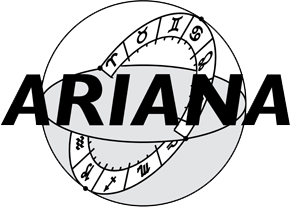

The first month of life is considered to be a neonatal period: it constitutes a kind of transition time between intrauterine life, where the fetus depended exclusively on its mother both for its survival and for the sensations and emotions that passed through it, and its new independent existence.

What does he do during this first month? Above all, he devotes between 17 and 20 hours a day to going about his favorite occupation: sleeping, with a sleep that, at first irregular, gradually becomes more regular. When awake, the newborn remains calm and quiet for two or three hours, he moves a little, in the form of anarchic wriggling, for one to two hours at the most and spends the rest of his days either one to four hours, crying, wailing and screaming. And above all, the second fundamental activity of babies less than a month old is feeding. In short, at first glance and if we stick to the two activities that seem the most “motivate”, the baby of this age is a heavy sleeper always between two meals.
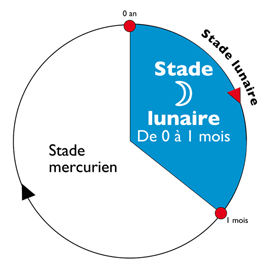
First of all, baby sleeps. And what does he do while he sleeps? Of course he dreams, so true is it that sleep only seems like inert activity, or even a lack of activity, to those who are awake. The dream is the activity of sleep. Who, what does the baby dream of during these long hours? Mystery. We only know one thing with certainty, having made video recordings of the sleep of thousands of babies: during his dreams, the baby’s face expresses exactly the same range of primordial sensations and emotions as an adult: joy, sorrow, pleasure, pain, surprise, anguish, anger, etc. His (filmed) reactions to the world with which his dreams are populated are therefore identical to ours. However, there is a size difference. We know that the dreams of older children and adults are largely made up of images and scenarios borrowed from daytime, conscious life, more or less metamorphosed by the realm of the unconscious to which sleep allows us to access. These dreams are thus supported by memorized experiences, sensations or emotions experienced during the waking time and recomposed by the imagination.
It is quite different with the dreams of newborns. They have neither independent personal experience nor memories, and for good reason, of this life in which they have just appeared. The beings, objects and situations of which their dreams are made are therefore unknown to us and moreover unknowable: it is impossible to interview babies to make them describe in detail the pictures of their nocturnal existence. Do they dreamily recall the sensations and emotions communicated to them by their mothers during pregnancy? Or do they sink, smiling so often at imperceptible angels, into dreams that are truer than reality, and which we have subsequently lost forever? Unable to answer. The dream of newborn babies is, along with birth and death, one of the deepest and most indecipherable mysteries.
One thing is certain: the reality of moon stage baby, it is essentially the dream, and the dream is precisely one of the main characteristics that the astrological tradition has attributed to the Moon, Earth’s satellite who governs this age of life. But to say that the reality of the baby is the dream is still not enough: the baby of this age makes no difference between dream and reality. For him, the world he dreams of is the world he lives in. This distinction between dream and reality, for us common and relevant, has no meaning for him. Indeed, whether he is dreaming or awake, he lives in a world fundamentally marked by non-duality.
“The baby is a person”, wrote a famous psychologist. This is true after the first month of its existence. But it’s wrong before. During the first four weeks after birth, the baby is not a person: he is the world, and the world is him. The newborn lives in a symbiosis, a communion so deep with his environment, with the world and the beings that surround him that he does not distinguish himself from it, that he makes no difference between the sensations that come to him. of the outside world and those of its own. If he is hungry, the whole universe is hungry and if he feels good, the world is full. State “neonatal”, where the child still lives in osmosis with the mother-world and the mother-world, as if he had not yet been expelled from the warm and gentle original placental waters, as if he were still bathed in amniotic fluid with which he was one.
A baby less than a month old is not a person, because to be a person is to be someone separate, a precise, different, original, identifiable individual. No: the baby in the lunar stage is intimately part of the world that inhabits him and where he lives, so intimately that he cannot distinguish himself from it. He is himself, of course, but he is also his mother, he is his cradle, he is the arms that carry him, he is the breast or the bottle he suckles, he is the sound he hears, the perfume he breathes, the angel he smiles at, the dream he has. The differentiation between the Self and the Other, the interior and the exterior means nothing to him: he lives in an undifferentiated universe, where there is no duality, he is in primordial and permanent contagion with the environment to which he belongs. totally. He has the impression, which adults will call an illusion, of living in a universe that corresponds to him completely, with which he is in perfect harmony.
It is so true that most child psychologists reject the term perception about the newborn: using the word “perceive”, it is still to evoke a duality, in this case a “collector” and a thing perceived. They prefer to speak of reception: the baby in the lunar stage receives the world internally in a global, undifferentiated way, much more than he perceives it externally. In the world as the tiny baby receives it, nothing really stands out. Moreover, at this age, the differentiation between what is commonly called the five senses has not yet taken place: for him, taste, hearing, smell, sight, touch are one and the same thing, one and the same sense which allows a global perception: if only one of its senses is stimulated, it is the whole which responds. A famous experiment has, moreover, proven this strange phenomenon: thus, if babies less than a month old are given to suck, without their having seen them, smooth pacifiers or bumpy pacifiers, and that they are then put in front of their eyes the two types of lollipops, those who had sucked smooth (or bumpy) lollipops visually recognize the one they had in the mouth, whereas at this age the link between touch and vision has not yet neurologically formed (this will only come around the fourth month). The baby of less than a month, not content with being an unrepentant dreamer, is therefore also characterized by a global, homogeneous, undifferentiated perception of the outside world with which he is in osmosis, in symbiosis, in fusion, with which he communicates. intimately, who is for him like a mother with whom he is one.
Arriving still weak, destitute, unfinished, unable to meet his own needs in this new extra-uterine world, the newborn has no choice: he must trust it, a total, original trust, primitive, without restrictions because at that age you don’t know what a restriction is. He abandons himself, he lets himself be carried without resistance, and his whole body, his whole being, all his instinctive reflexes tell him indiscriminately, in his initial unconsciousness, that he cannot do otherwise because nothing else is possible only abandonment, letting go, laissez-faire, an absolute trust that cannot be disputed. He can only unconsciously bet that the new environment in which he evolves will be as buoyant as the placenta from which he comes. The tiny baby cannot decide anything by himself, he can neither want, nor protest, nor dispute, nor defend himself: he can only “let go”, he must passively and massively accept the state that is his, in “Hoping” that his mother and the world will provide for him.
In fact, for him it is not even a question of“hope” : the newborn in the lunar stage has no hope, because he is incapable of anticipating. But hope is an anticipation… So no hope. Just this primitive confidence which imperatively whispers to him, from the depths of his unconsciousness, that since his extra-uterine life has begun, there is no “reasons” that it ceases, that it is a flux in which one must let oneself be carried away. The being within which he lived will continue to welcome him, as usual, as always, so true is it that the baby has no consciousness of time, and therefore lives in eternity. Her “let go” is not a spiritual exercise: it is a vital necessity that has no alternative. His spontaneous abandonment is not a pathological letting go: it is not an act of indecisive resignation, but the expression of the fact that he has no choice but to abandon himself to this and those who will take care of him. Thus, the newborn in the lunar stage spontaneously trusts, at the risk of showing unconscious naivety, inconsistent optimism.
The lunar stage baby does not distinguish between himself and the outside world, nor does he distinguish between his self and that of the other. This attitude gives him a type of sociability that is paradoxical to say the least. Indeed, the newborn of less than a month apparently lives in deep and most of the time peaceful solitude. He seems to have no need to communicate with anyone: the world of his dreams and his overall perception of a “reality-magma” undifferentiated which characterizes his waking state seem to be totally sufficient for him. Nothing and no one really focuses his floating attention. And why would he feel the need to enter into social contact with the other, since the latter is an intimate part of his self fused in the environment in which he finds himself? To communicate with others is to perceive oneself as a distinct individual seeking to establish a relationship with one or more people who are also perceived as distinct individuals. But this perception does not exist in the baby.
But on the other hand, he is totally dependent on others to live: if his mother does not take care of him, his nutritional needs, his comfort, if no one ensures his protection and provides for his well-being, he is unable to survive on his own. Remember that the only way to “communication” sound available to him at this age consists of undifferentiated crying. Most of the time, baby only starts to cry when he is in a state of lack, of discomfort, of incompleteness: when he is hungry, when he needs to be relieved of his discomfort by changing his diapers, or when he reacts globally to a disturbing climate for his basic need for peace and rest. His crying therefore in no way constitutes a search for communication: they simply testify to the fact that he generally feels bad, unsatisfied, and constitutes a kind of “S.O.S” vital. Moreover, as soon as he has nursed, as soon as he has been cradled, that is to say as soon as his bodily needs, as egocentric as they are unconscious, have been satisfied, baby immediately returns to his placid solitude. He does not communicate for the pleasure of the encounter, but for bodily displeasure.
Paradoxical solitude of the newborn: he can only live in his serene isolation, in his cottony hermitage, because he is surrounded by beings who provide for all his needs. If these beings are absent, if they do not actively take care of maintaining its tranquility and its well-being, then the loneliness of the baby becomes a hell. The lunar baby is therefore both solitary and united with its human and affective environment, solitary because united, with a vital, instinctive, unconscious, pre-social solidarity. To fully inhabit his solitude, to feel good there, he must imperatively feel carried by a favorable environment, by the loving arms of a mother, by the cozy comfort of his cradle. The sociability of the baby is therefore of the fusional type: he has an intimate relationship of empathy with others which does not result from any will, from any desire, from any project, but from a deep and vital necessity. He can only be quietly alone if he is surrounded by people who not only leave him in peace, but ensure him a harmonious experience.
During the first month, the baby is basically a routine being, who hates being disturbed by noises or discordant and untimely movements. The more his sleep and the time of his feedings are regularized, the more he feels well, rested, blissfully happy. It is essential for his overall balance that he feels intimately belonging to a calm, reassuring, harmonious environment, free of any discordant note, protected from any sudden modification of his rhythms of life. Supporter of the least effort, follower of the lines of least resistance, he gets used to familiarizing himself gently, quietly with his new living environment, which he assimilates and integrates and to which he allows himself to be passively assimilated and integrated. In this warm cocoon of habits where he slips into, where he forgets himself, he finds the total plenitude of the present moment to which he aspires with all his being, without past, without future, without regret or hope, without project: a kind of primary nirvana which of course evokes paradise lost for adults…
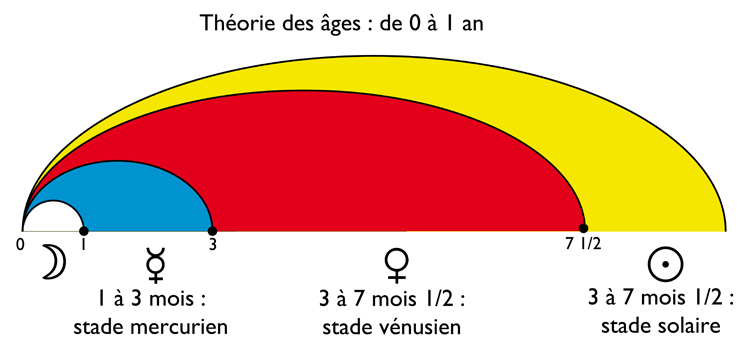
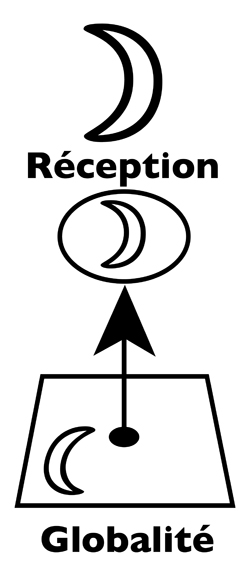
We are in a lunar state, like a baby less than a month old, when, like a newborn baby less than a month old, we confidently and peacefully surrender to the fullness of the moment, when we feel quietly belong to our daily environment, when we do not have to force ourselves to feel good, at ease, when “everything’s fine”. We are in a lunar state when we find ourselves with our familiars, our intimates, our spouse, those on whom we are sure of being able to count, those who, by force of the habits of living together, know our needs so well that they do not bother us because they understand us intimately, those with whom it is not necessary to play a social role and who allow us to be fully ourselves, with whom we can be quietly alone while living in their company.
We are still in a lunar state when we merge completely with the landscapes that surround us: I am this landscape which is an intimate part of myself, there is no longer any distinction between the observer and the thing observed, between my self and the rest of the world. We are always in the lunar state when we feel carried by circumstances, when we do not have to fight for our survival, when we let ourselves go to a well-being that needs neither justification nor purpose, when we agree without resisting circumstances, when we do not constrain any discipline: because we feel good inside ourselves, in harmony with the universe, we quite naturally feel good with others who also do part of this universe.
We are in a lunar state when we feel fully ourselves in old clothes that are like a second skin, to which we are so used that we no longer even feel their presence, their existence, when we savor the relaxation of a lukewarm, foamy bath, naked as on the first day, without thinking of anything. We are always in a lunar state when we are at home, in a calm and welcoming atmosphere, when we share an informal meal with friends, in an atmosphere of conviviality devoid of any artifice, for the simple pleasure of “great food”. We are finally in a lunar state when we sleep in a serene, rested sleep, when we dream half-awake, free from all obligations, when we do not focus our attention on any specific point, when we are in a state of total receptivity. towards our environment and the beings that inhabit it.
Whether child or adult, each of us experiences these lunar states with more or less intensity, and more or less frequently. Some experience an almost pathological difficulty in surrendering peacefully, in letting themselves go to this primary well-being, to this primitive and original tranquility of the newborn. For others, on the contrary, such an attitude seems to go without saying: there is no question for them of forcing themselves and forcing the course of things, of renouncing their sacrosanct plenitude. “cushy”. Between the two, there are those who for one reason or another feel compelled to fight against their lunar tendencies to abandon, to let go, while having the impression of losing something fundamental for their balance. of life…
The study of the astrological chart of each individual informs us about the importance and the frequency of these “lunar states”. Those in whom the moon is dominant at birth live more often than others, throughout their existence, these lunar states. Does this mean that they will always behave like immature, weak, dependent, naive, impressionable little babies? Of course not… But those retain a vivid and permanent memory of this “lunar condition” of the first month of their life. From childhood to adolescence to adulthood, in a different way at each stage of their life, they will need more than others to preserve this peace of mind, this feeling of plenitude, they will seek more than others of close intimate relationships and supportive environments.
▶ The Lunar: Psychological profile
▶ The lunar function (homogeneous wholeness)
▶ Pouvoirs de Soleil-Lune : la Lune
▶ Moon: intensive power
▶ Espace personnel et aura lunaire
▶ Fonction lunaire et libéralisme économique
▶ Introduction to the Theory of Planetary Ages
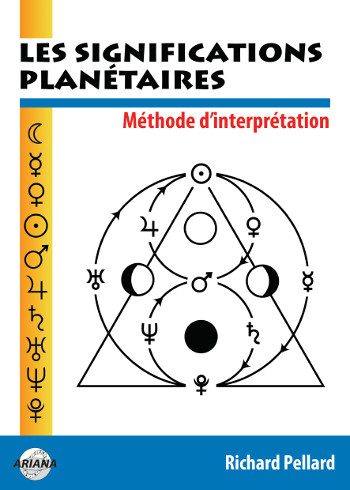
Les significations planétaires
par
620 pages. Illustrations en couleur.
La décision de ne traiter dans ce livre que des significations planétaires ne repose pas sur une sous-estimation du rôle des Signes du zodiaque et des Maisons. Le traditionnel trio Planètes-Zodiaque-Maisons est en effet l’expression d’une structure qui classe ces trois plans selon leur ordre de préséance et dans ce triptyque hiérarchisé, les Planètes occupent le premier rang.
La première partie de ce livre rassemble donc, sous une forme abondamment illustrée de schémas pédagogiques et tableaux explicatifs, une édition originale revue, augmentée et actualisée des textes consacrés aux significations planétaires telles qu’elles ont été définies par l’astrologie conditionaliste et une présentation détaillée des méthodes de hiérarchisation planétaire et d’interprétation accompagnées de nombreux exemples concrets illustrés par des Thèmes de célébrités.
La deuxième partie est consacrée, d’une part à une présentation critique des fondements traditionnels des significations planétaires, d’autre part à une présentation des rapports entre signaux et symboles, astrologie et psychologie. Enfin, la troisième partie présente brièvement les racines astrométriques des significations planétaires… et propose une voie de sortie de l’astrologie pour accéder à une plus vaste dimension noologique et spirituelle qui la prolonge et la contient.
Téléchargez-le dès maintenant dans notre boutique
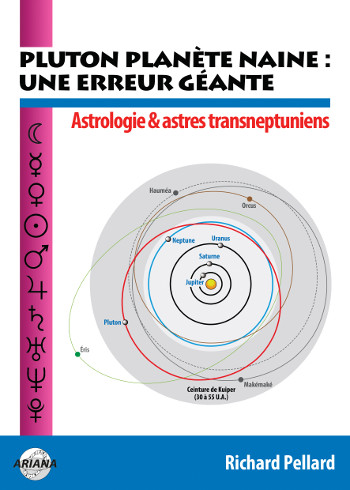
Pluton planète naine : une erreur géante
par
117 pages. Illustrations en couleur.
Pluton ne fait plus partie des planètes majeures de notre système solaire : telle est la décision prise par une infime minorité d’astronomes lors de l’Assemblée Générale de l’Union Astronomique Internationale qui s’est tenue à Prague en août 2006. Elle est reléguée au rang de “planète naine”, au même titre que les nombreux astres découverts au-delà de son orbite.
Ce livre récapitule et analyse en détail le pourquoi et le comment de cette incroyable et irrationnelle décision contestée par de très nombreux astronomes de premier plan. Quelles sont les effets de cette “nanification” de Pluton sur son statut astrologique ? Faut-il remettre en question son influence et ses significations astro-psychologiques qui semblaient avérées depuis sa découverte en 1930 ? Les “plutoniens” ont-ils cessé d’exister depuis cette décision charlatanesque ? Ce livre pose également le problème des astres transplutoniens nouvellement découverts. Quel statut astrologique et quelles influences et significations précises leur accorder ?
Enfin, cet ouvrage propose une vision unitaire du système solaire qui démontre, chiffes et arguments rationnels à l’appui, que Pluton en est toujours un élément essentiel, ce qui est loin d’être le cas pour les autres astres au-delà de son orbite. Après avoir lu ce livre, vous saurez quoi répondre à ceux qui pensent avoir trouvé, avec l’exclusion de Pluton du cortège planétaire traditionnel, un nouvel argument contre l’astrologie !
Téléchargez-le dès maintenant dans notre boutique